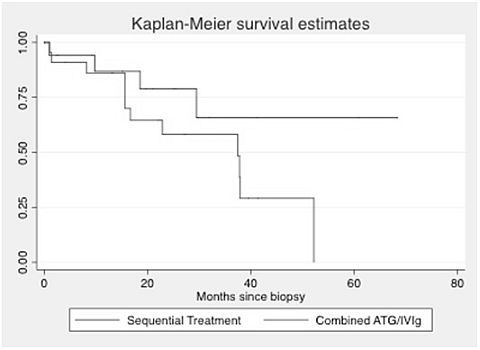In Vivo Interaction between ATG and IVIg May Decrease the Efficacy of Antibody Mediated Rejection Treatment
Division of Nephrology, University of Washington, Seattle
Puget Sound Blood Center, Seattle
Division of Transplant Surgery, University of Washington, Seattle
Meeting: 2013 American Transplant Congress
Abstract number: B1004
Treatment of antibody mediated rejection(AMR) is not standardized. Anti-thymocyte globulin(ATG) is commonly used in combination with intravenous immunoglobulin(IVIg) and plasmapheresis(Px). Our in vitro data show that IVIg affects ATG, but not rituximab, binding to lymphocytes and decreases lymphocyte depletion. Based on these findings we have considered a sequential approach to AMR treatment with ATG, with or without rituximab, and antibody depleting treatment with IVIg and Px at a later stage if rejection was persistent.
We examined all kidney allograft AMR cases at our institution from 2004-2012. We identified a group of 17 patients that received sequential treatment with ATG first and a group of 22 patients that received combined treatment of ATG with IVIg and Px. Baseline characteristics were similar in both groups, but more rituximab was used as part of initial treatment in the combined group (Table 1). There were 4 allograft losses in the sequential group and 12 in the combined(p=0.05). Follow up time was similar. Creatinine levels and DSA clearance were not different at one year after treatment (Table 2). Kaplan-Meier survival estimates are shown, p=0.12 (Figure 1). We estimate a 3.9-fold increase in the risk of allograft failure associated with the use of combined AMR treatment (95%CI:.96,15.8), p=0.057.
Despite sample size limitations our data suggest that in vivo interaction between ATG, IVIg and Px may decrease AMR treatment efficacy and we therefore propose a sequential approach.
| Sequential | Combined | p | |
| Age | 42+/-12 | 42+/-15 | 0.94 |
| Male Gender | 9 | 12 | 0.92 |
| Nadir Creatinine | 1.29+/-0.33 | 1.22+/-0.29 | 0.51 |
| Biopsy Time from Transplant (months) | 67+/-54 | 45+/-51 | 0.19 |
| Creatinine at Biopsy | 2.9+/-1.5 | 3.1+/-1.6 | 0.82 |
| Proteinuria at Biopsy | 0.49+/-0.65 | 0.5+/-0.4 | 0.88 |
| Rituximab | 6 | 18 | 0.003 |
| Sequential | Combined | p | |
| Graft Failure | 4 | 12 | 0.05 |
| Follow Up (months) | 24+/-19 | 23+/-14 | 0.77 |
| Creatinine at 1 Year | 2.3+/-1.1 | 1.9+/-0.7 | 0.26 |
| Cleared Class I DSA | 6 | 4 | 0.1 |
| Cleared Class II DSA | 4 | 4 | 0.89 |

To cite this abstract in AMA style:
Kuriakose C, Warner P, Nelson K, Kieran N, Bakthavatsalam R, Davis C, Leca N. In Vivo Interaction between ATG and IVIg May Decrease the Efficacy of Antibody Mediated Rejection Treatment [abstract]. Am J Transplant. 2013; 13 (suppl 5). https://atcmeetingabstracts.com/abstract/in-vivo-interaction-between-atg-and-ivig-may-decrease-the-efficacy-of-antibody-mediated-rejection-treatment/. Accessed February 28, 2026.« Back to 2013 American Transplant Congress
